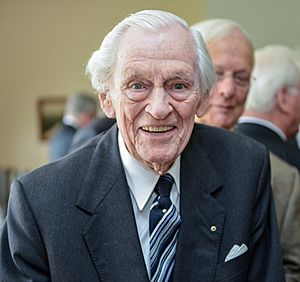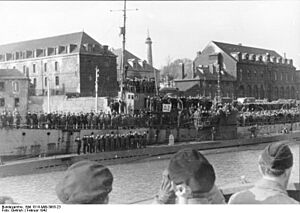Reinhard Hardegen facts for kids
Quick facts for kids
Reinhard Hardegen
|
|
|---|---|
 |
|
| Born | 18 March 1913 Bremen, Germany |
| Died | 9 June 2018 (aged 105) Bremen, Germany |
| Allegiance | |
| Service/ |
|
| Years of service | 1934–45 |
| Rank | Korvettenkapitän |
| Unit | 3rd U-boat Flotilla 2nd U-boat Flotilla |
| Commands held | U-147 (11 December 1940–4 April 1941) U-123 (19 May 1941–31 July 1942) Marine-Infanterie-Regiment 6 (February–May 1945) |
| Battles/wars | World War II
|
| Awards | Knight's Cross of the Iron Cross with Oak Leaves |
| Other work | Businessman and Politician |
Reinhard Hardegen (born March 18, 1913 – died June 9, 2018) was a German U-boat commander during World War II. He was known for sinking many ships. After the war, he was a prisoner for a year and a half. Later, he became a successful oil businessman and served on Bremen's city council for over 32 years.
Contents
World War II Service
Hardegen started his navy career as a First Watch Officer on the U-boat U-124. After two patrols, he got his own command, a smaller U-boat called U-147, in December 1940. He operated out of Kiel, a city in Germany.
His first patrol with U-147 began shortly before the new year. He was ordered to patrol near the Hebrides islands. On this patrol, he had some challenges. One torpedo didn't work, and he had to quickly dive to avoid a destroyer. During the dive, his boat was damaged, forcing him to surface for repairs very close to the enemy ship. Luckily, the darkness kept them hidden. Despite engine problems, he managed to sink a Norwegian ship called Augvald. He later tried to attack more ships, but his torpedoes failed again. Soon after, he was called back to Kiel.
After this, Hardegen was given command of a larger U-boat, U-123, based in Lorient, France. His first patrol with U-123 began in June 1941. He headed towards West Africa to target British ships. During this patrol, he accidentally sank a neutral Portuguese ship, the Ganda, thinking it was British. The German navy leader, Dönitz, ordered this event to be removed from the U-boat's logbook.
In October 1941, Hardegen went on another patrol in the North Atlantic. He attacked a British ship, the HMS Aurania. It was badly damaged but managed to get towed to safety. Hardegen picked up a survivor from the ship, who became a prisoner of war.
First Patrol to America
On December 23, 1941, U-123 began its journey for Operation Drumbeat. This was a secret mission to attack the American coast shortly after the United States joined the war. Hardegen was told to go near New York City. He had to use basic maps and even a pocket atlas for navigation because of the mission's secrecy.
After sinking two ships, the Cyclops and Norness, Hardegen decided to rest his U-boat on the ocean floor and wait for night. On the night of January 15, he entered New York Harbor. He almost ran aground, mistaking a shore light for a ship. His crew was excited to see the city lights, but Hardegen didn't stay long because there weren't many merchant ships. On his way out, he sank a British tanker called Coimbra.
Hardegen then sailed south along the coast, hiding underwater during the day and surfacing at night. He faced little resistance from the American navy or air force. On January 19, he sank three ships near Cape Hatteras. A few hours later, he found five more ships and attacked them with his last torpedoes and his deck gun. He sank one ship and damaged another, the tanker Malay, which still managed to reach New York.

With no torpedoes left and one engine not working well, Hardegen decided to head home. On the way, he spotted a large Norwegian whaling ship, the Kosmos II. The captain of the Kosmos tried to ram U-123. Hardegen quickly turned his U-boat and sped away. It took over an hour for him to get far enough away to be safe.
During the trip back, he used his deck gun to sink a British ship, the Culebra, but his U-boat was damaged by return fire. The next night, he sank another Norwegian ship, the Pan Norway. After this attack, Hardegen ordered a nearby neutral ship to pick up the survivors. This first patrol resulted in nine ships sunk over two weeks.
On January 23, Hardegen learned he would receive the Knight's Cross of the Iron Cross for sinking over 100,000 tons of Allied ships. He returned to Lorient on February 9 and was welcomed as a hero.
Second Patrol to America
On March 2, 1942, Hardegen left for his final patrol, again heading to American waters. He sank the American tanker Muskogee on March 22 and the British tanker Empire Steel on March 24. The Empire Steel, carrying gasoline, burned for five hours. The crew of U-123 called that night the "Tanker Torch night."
On March 26, Hardegen attacked an American ship, the USS Atik, thinking it was a regular merchant ship. After hitting it with a torpedo, he surfaced to finish it with his deck guns. But the Atik was a special "Q-ship" with hidden guns, and it started firing back and tried to ram him! U-123 was hit eight times, and one crew member was badly wounded. Hardegen managed to sink the Atik with another torpedo while submerged.
Hardegen's second patrol continued along the Florida coast. He attacked the American tanker Liebre on April 1. Although the tanker was badly damaged, an approaching patrol boat forced Hardegen to dive and leave. The Liebre was later repaired. On the night of April 8, U-123 sank two tankers, the SS Oklahoma and the Esso Baton Rouge, near St. Simons Island, Georgia. These two tankers were sunk in shallow water, so they were later refloated and put back into service. The next night, U-123 sank the cold storage ship SS Esparta.
On April 11, U-123 sank the SS Gulfamerica near Jacksonville, Florida. This ship was on its first trip, carrying fuel oil. After hitting it with a torpedo, Hardegen used his deck gun to finish it. He noticed many people gathering on the beach to watch. He decided to move his U-boat to the land side of the tanker to attack, even though it was risky. The tanker caught fire, and Hardegen left as planes and patrol boats approached.
An aircraft forced U-123 to crash dive, and it landed on the ocean bottom. A destroyer, the USS Dahlgren, dropped depth charges, causing heavy damage. Hardegen thought the destroyer would attack again and ordered the secret codes and machinery destroyed, preparing to abandon the boat. He was supposed to open the hatch, but he froze with fear. Luckily, the Dahlgren moved away, allowing U-123 to make emergency repairs and escape. Hardegen later said, "Only because I was too scared was I not captured."
On April 13, U-123 attacked the US ship SS Leslie with its last torpedo. It sank quickly near Cape Canaveral. About two hours later, Hardegen shelled and sank the Swedish ship Korsholm.
Hardegen returned home to Lorient on May 2, ending his active career as a U-boat commander. He did take the boat back to Kiel for repairs in May 1942.
Hardegen did not like the Nazi government. He often disagreed with their ideas. He also tried to help survivors from ships he sank, giving them food and directions to safety. In one case, he even stopped a neutral ship and made it pick up survivors. He is remembered for saving many Norwegian sailors and others from the sea.
Hardegen said that when he met Adolf Hitler and received his award, he first thought Hitler was a "nice fellow." But he later realized this was a "big mistake." By 1942, Hardegen and his crew understood that Hitler was leading Germany towards disaster. Hardegen once argued with Hitler during a dinner, saying that the U-boat war wasn't getting enough resources. He believed Hitler was too focused on the land war. Hardegen said he had a duty to tell Hitler the truth.
Later Duties
On July 31, 1942, Hardegen stopped commanding U-123. He became an instructor for U-boat training. Later, he worked in the torpedo department, testing new torpedoes. In the last months of the war, he commanded a group of soldiers, fighting against British forces near Bremen. Most of his officers were killed, but Hardegen survived because he was in the hospital with an illness. At the very end of the war, he worked on the staff of Admiral Dönitz in Flensburg, where he was arrested by British troops.
Life After the War
After the war, Hardegen was mistaken for another person with the same last name who was part of a different group (the SS). It took him a year and a half to prove who he really was to the Allied soldiers. He returned home in November 1946. He started a business, first selling things from a bicycle, then from a car. In 1952, he started a very successful oil trading company.
Hardegen also became a politician. He served as a member of Parliament for the Christian Democrats in his hometown of Bremen for 32 years. It's interesting that his oil business represented companies like Texaco, whose ships he had once sunk during the war. He visited the United States many times and became friends with people he had fought against, including sailors who had tried to kill him. In 2012, the modern German military honored him for his service during the war. He turned 100 in March 2013 and was still in good health, playing golf and driving a car.
Hardegen returned to Jacksonville, Florida, in 1990, where he was welcomed as an honored guest. He said the town was "very friendly" to him.
Reinhard Hardegen passed away on June 9, 2018, at the age of 105.
Awards and Honors
- Wehrmacht Long Service Award 4th Class (1937)
- Iron Cross (1939)
- 2nd Class (1940)
- 1st Class (1941)
- Knight's Cross of the Iron Cross with Oak Leaves
- Knight's Cross (1942) as commander of U-123
- 89th Oak Leaves (1942) as commander of U-123
- U-boat War Badge (1939) (1940)
- with Diamonds (1942)
- War Merit Cross 2nd Class (1944)
 | Kyle Baker |
 | Joseph Yoakum |
 | Laura Wheeler Waring |
 | Henry Ossawa Tanner |

